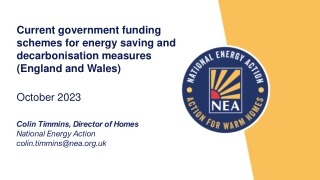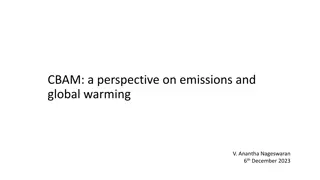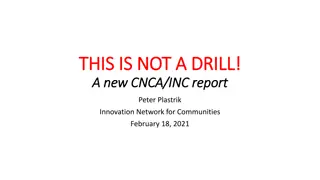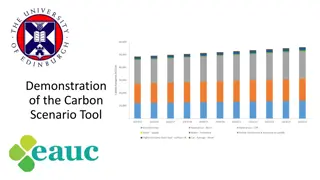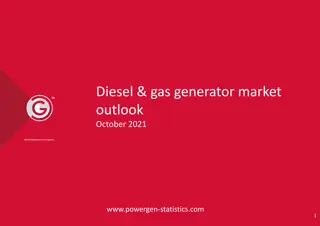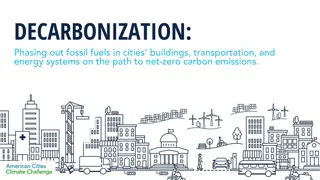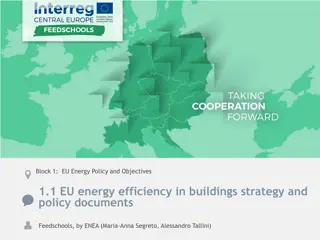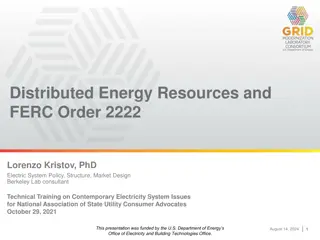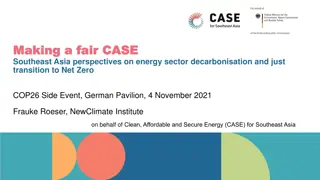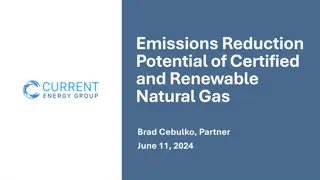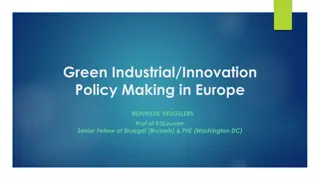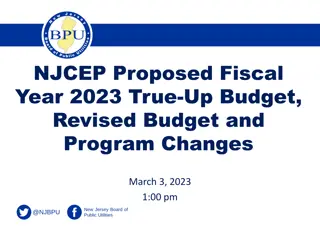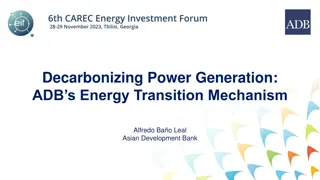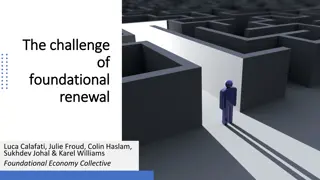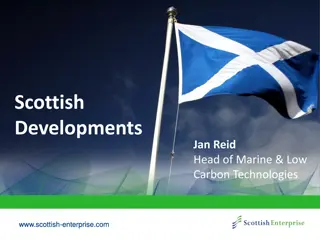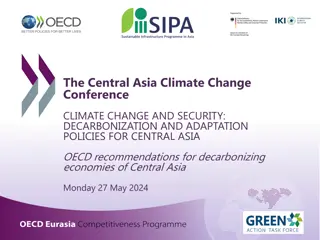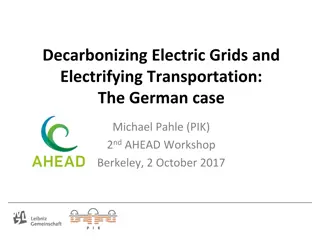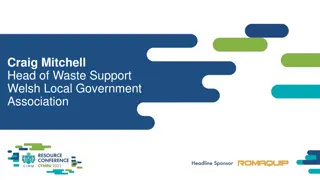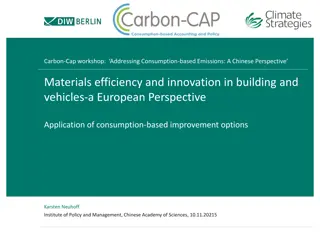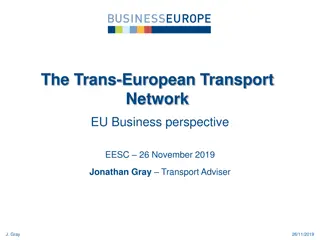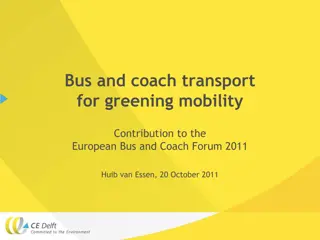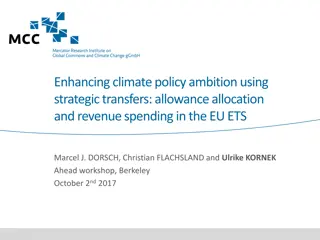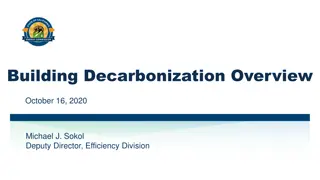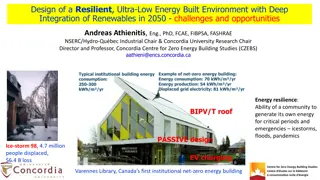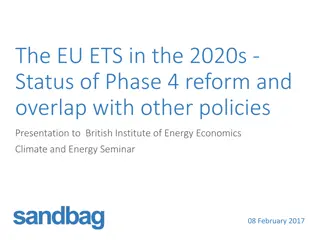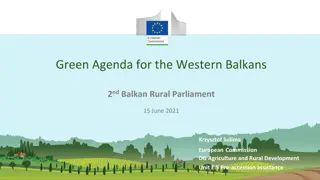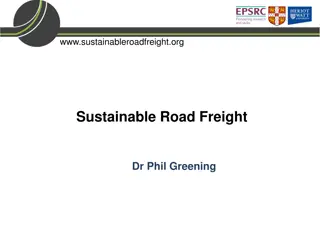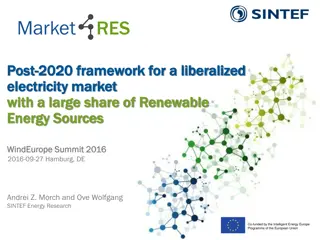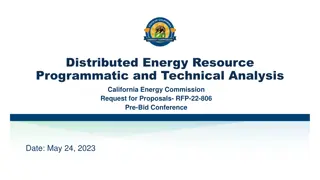Government Funding Schemes for Energy Efficiency
Overview of current UK government schemes like ECO, GBI, and more for energy-saving measures and decarbonization in homes. Includes figures, targets, and programs available in England and Wales. Details on EPCs and installation standards are also provided.
0 views • 28 slides
Northern Powergrid Engaging Distribution System Operators in your Local Area Energy Plan
Northern Powergrid, responsible for electricity distribution in the North East, Yorkshire, and Northern Lincolnshire, plays a vital role in moving electricity to homes and businesses. Engaging with stakeholders, they plan for a net zero society in their new business plan period. Through their DSO un
0 views • 11 slides
Historic Investments in Climate Action: Inflation Reduction Act May 2023
The Inflation Reduction Act (IRA) of May 2023 focuses on making significant investments in climate action to reduce U.S. emissions by an estimated 40% by 2030. This act supports disadvantaged communities, the clean energy industry, and aims to drive emissions reductions over the next decade while pa
5 views • 14 slides
Harnessing Carbon Markets for Sustainable Development in Pakistan
Understanding the significance of carbon markets, this content delves into the interplay between economic growth and environmental sustainability, emphasizing the urgency to limit unsustainable practices. It explores mechanisms such as carbon pricing and cap-and-trade systems in the context of clima
0 views • 17 slides
London Infrastructure Framework Building Sustainable and Inclusive Future
London Infrastructure Framework aims to improve planning and delivery efficiency, enhance project support, and promote sustainable growth in infrastructure development across London. The framework focuses on embedding sustainability, reaching net zero, and fostering innovation clusters to drive incl
2 views • 11 slides
Highlights from 20th CAREC Transport Sector Coordinating Committee Meeting
The 20th CAREC Transport Sector Coordinating Committee (TSCC) meeting focused on discussing key priorities for 2023-2024, including knowledge dissemination, decarbonization efforts, border crossing infrastructure, regional transport corridors, and digitalization of operations. The meeting also addre
0 views • 10 slides
Understanding Energy Savings Performance Contracting (ESPC) and ESCOs
Energy Program by Kirsten G. Wilson, PE covers topics like ESPC, Energy as a Service, decarbonization plans, and more. Explains ESPC as a collaborative process for achieving energy savings. Discusses the role of DES in project oversight. Details the role of Energy Service Companies (ESCOs) in energy
3 views • 18 slides
Economic Impact of Decarbonizing Europe and Interregional Relations Study
The study examines the economic impact of decarbonizing Europe through the European Green Deal, focusing on the substitution of coal production and import. Various scenarios are evaluated in terms of regional GDP, employment, and CO2 emissions. Additionally, the study explores interregional relation
2 views • 15 slides
CBAM: a perspective on emissions and global warming
Key considerations for Carbon Border Adjustment Mechanism (CBAM) and carbon pricing are discussed, emphasizing the complexity and inertia of transitioning to a low-emission economy, the need for durable emission reduction solutions, and the impact of non-optimal temperatures on global mortality rate
0 views • 7 slides
UK Shared Prosperity Fund
The UK Shared Prosperity Fund in North Yorkshire aims to support local communities, businesses, and skills development through allocated funding across various sectors. The fund focuses on investment priorities such as community support, local business empowerment, and skills enhancement. With a str
0 views • 8 slides
Communities Taking Bold Actions for Decarbonization
The report highlights how 1,750 communities globally have adopted Climate Emergency declarations to accelerate progress towards carbon neutrality. It showcases cities like Barcelona, Bristol, and Copenhagen leading the way with innovative strategies to reduce emissions and enhance decarbonization ca
0 views • 13 slides
Understanding the Carbon Scenario Tool for Climate Change Management
The Carbon Scenario Tool (CST) is a valuable resource developed by the University of Edinburgh and the Scottish Funding Council to manage, report, and forecast carbon emissions for university estates and operations. It enables the calculation of the impact of carbon reduction projects and the develo
2 views • 18 slides
Diesel and Gas Generator Market Trends and Transition to Alternative Energies
In October 2021, the diesel and gas generator market outlook reflects growth with key insights on market performance in H1 2021. The market research company specializes in generating sets industry analysis, covering global databases and customized researches. The transition towards decarbonization t
0 views • 9 slides
Decarbonization and Path to Net-Zero Emissions in Cities
Exploring the journey towards decarbonization and achieving net-zero carbon emissions in cities through initiatives like equitable outcomes, transportation enhancements, renewable energy integration, and sustainable building practices for both new and existing structures. The focus is on going beyon
0 views • 11 slides
European Energy Efficiency Strategies and Policies in Buildings
This training package focuses on EU energy efficiency strategies, particularly in buildings, highlighting the current policy framework, long-term renovation strategies, and the roadmap towards Nearly Zero Energy Buildings. The module aims to equip local authorities with necessary knowledge to implem
1 views • 49 slides
Insights on Distributed Energy Resources and FERC Order 2222
Understand the growth of Distributed Energy Resources (DERs) and the impact of FERC Order 2222 on electricity systems. Explore drivers of customer adoption, benefits, challenges, and the role of DERs in decarbonization and resilience. Gain valuable insights into the evolving landscape of energy gene
0 views • 22 slides
Southeast Asia Perspectives on Energy Transition to Net Zero - COP26 Event Insights
Frauke Roeser from the NewClimate Institute discussed the imperative of a just transition in Southeast Asia's energy sector decarbonization towards achieving Net Zero goals. The presentation highlighted the need for creating decent jobs aligned with national development priorities, emphasizing the g
0 views • 11 slides
Challenges and Potential of Certified and Renewable Natural Gas
Limited potential for decarbonization through compressed natural gas due to challenges in measuring and verifying emissions reductions. Renewable natural gas also faces technical and economic limitations. Synthetic methane and thermal gasification technologies are not widely available or cost-compet
0 views • 8 slides
State of Power Decarbonization and Resource Planning in Q1 2023
In Q1 2023, there was no recent action on power decarbonization and resource planning by 47 states plus DC & PR. The activity ranged from no action to 10 or more actions in terms of power decarbonization and resource planning. The greatest contributing resources to the state generation mix in 2022 w
0 views • 16 slides
Green Industrial Innovation Policy Making in Europe by Reinilde Veugelers
Shifting economies towards green industrial innovation in Europe is a significant transformation that requires reconciling various objectives like decarbonization, economic growth, job creation, and global competitiveness. The role of innovation in green industrial policy is crucial for delivering n
2 views • 13 slides
NJCEP Proposed FY23 True-Up Budget Meeting Summary
Meeting held on March 3, 2023, to discuss the proposed Fiscal Year 2023 True-Up Budget, Revised Budget, and Program Changes for New Jersey's Clean Energy Program. The meeting covered agenda items, meeting logistics, documents for review, background information, staff recommendations, true-up calcula
0 views • 20 slides
Energy Transition Mechanism Overview for Decarbonizing Power Generation
Energy Transition Mechanism (ETM) is a program led by the Asian Development Bank to support the transition to clean energy by providing funding, grants, and technical assistance. It involves partnerships with investors, lenders, governments, and philanthropies to facilitate coal retirement transacti
1 views • 12 slides
The Challenge of Foundational Renewal in Economy
The challenge of foundational renewal encompasses two distinct eras - FE 1.0 (1880-1950) focused on urban and industrial society, while FE 2.0 (post-2020) aims to address climate change and biodiversity. Despite past achievements, obstacles like structural changes and lack of leadership hinder progr
0 views • 14 slides
Scottish Energy Developments and Innovation in Marine and Low Carbon Technologies
Scotland's energy sector is pioneering climate-friendly initiatives towards decarbonization by 2030. The focus lies on supporting renewable energy sources, enhancing energy system flexibility, efficiency, and resilience, and promoting the marine sector's advancements in tidal energy projects. The co
0 views • 11 slides
Decarbonization Efforts in Central Asia: Challenges and Opportunities
Central Asia, like much of the world, is grappling with the transition to low-carbon economies and net-zero commitments. This involves overcoming reliance on fossil fuels, integrating clean energy solutions, and adopting new technologies. The region's efforts align with global goals under the Paris
0 views • 11 slides
Decarbonizing Electric Grids and Electrifying Transportation in Germany
In Germany, the focus is on decarbonizing the electric grids and electrifying transportation to achieve deep decarbonization. Despite challenges in climate policy, advancements in technology and policy options offer hope. Electric vehicles are gaining momentum, though barriers like cost and range st
0 views • 19 slides
Transition & Recovery Support Programme Overview for Local Authorities in Wales
Transition & Recovery Support Programme aims to help Welsh local authorities achieve net zero carbon emissions by 2030 through various initiatives such as governance restructuring, deep dives with the Climate Strategy Panel, and focus on circular economy. The program emphasizes decarbonization strat
0 views • 17 slides
Addressing Consumption-based Emissions: Perspectives on Materials Efficiency and Innovation
This workshop delves into the importance of addressing consumption-based emissions, with perspectives from both Chinese and European experts. Key topics include the role of carbon pricing, inclusion of consumption in carbon pricing mechanisms, and strategies for reducing emissions from carbon-intens
0 views • 20 slides
Enhancing European Transport Infrastructure: A Business Perspective
The Trans-European Transport Network plays a vital role in strengthening Europe's transport system by focusing on connectivity, cross-border infrastructure, co-modality, decarbonization, and digitalization. This report emphasizes the importance of accelerating network development, streamlining measu
0 views • 5 slides
Greening Mobility: Decarbonizing Transport and Future Trends
Decarbonizing transport is a significant challenge that necessitates low-carbon technologies and strategies to reduce CO2 emissions. Comparing environmental performance of transport modes reveals the importance of factors such as occupancy rates and fuel efficiency. Coaches emerge as a strong conten
0 views • 15 slides
Strategic Transfers for Enhancing Climate Policy Ambition in EU ETS
This study explores the use of strategic transfers, allowance allocation, and revenue spending in the EU ETS to enhance climate policy ambition. Motivated by the EU's goal of reducing emissions by 80% by 2050, the research delves into transfer decisions, cap-setting roles, challenges for decarboniza
0 views • 21 slides
Building Electrification Initiatives at Sacramento Municipal Utility District (SMUD)
Explore SMUD's proactive approach towards building electrification to achieve net-zero carbon emissions by 2030. Learn about the benefits of decarbonization, energy efficiency paradigms, and grid optimization strategies, emphasizing a shift towards cleaner and safer energy sources.
0 views • 28 slides
California Building Decarbonization Initiatives Overview
This overview delves into California's efforts towards reducing greenhouse gas emissions in commercial and residential buildings by 40% below 1990 levels by 2030. It covers key proceedings, strategies, assessment timelines, load management standards, and utility programs aimed at achieving decarboni
0 views • 21 slides
Building Resilient & Sustainable Environments with Renewable Integration
Challenges and opportunities in achieving energy resilience, sustainability, and innovation in Canada's built environment by 2050. Focus on decarbonization, building design for emergencies, transversal innovation, and urban planning for a better future.
0 views • 4 slides
Overview of EU ETS in the 2020s: Phase 4 Reform and Policy Implications
The presentation discusses the current state of the EU ETS, focusing on the reform measures for Phase 4 starting in 2021. It covers compliance with emission targets, structural reforms like the Market Stability Reserve, and preliminary data showing emissions reductions. The analysis highlights chall
0 views • 20 slides
Advancing the Green Agenda for Sustainable Development in the Western Balkans
The Green Agenda for the Western Balkans focuses on five pillars: a green oath, mobilizing research and innovation, the green and digital transition for economic growth, decarbonization for climate, energy, and mobility, and depollution of air, water, and soil. Additional key areas include circular
0 views • 9 slides
Sustainable Solutions for Reducing CO2 Emissions in Road Freight Industry
Sustainable Road Freight initiative by Dr. Phil Greening focuses on technologies to reduce fuel consumption and CO2 emissions, logistics measures for efficiency, and a decarbonization pathway for the UK's transport sector. The strategies include using biofuels, electrification, efficient vehicle tec
0 views • 4 slides
Challenges and Insights in the Post-2020 Renewable Energy Market
The WindEurope Summit 2016 discussed the integration of renewable energy sources in the European electricity market post-2020 through the Market4RES project. Key points covered include the EU-wide Target Model, challenges for future electricity markets related to security of supply and cost-effectiv
0 views • 14 slides
Distributed Energy Resource Programmatic and Technical Analysis RFP-22-806 Overview
This RFP by the California Energy Commission aims to support analysis of customer energy use data, including AMI data, for major utilities in California. The goal is to enhance understanding of energy load, impacts of decarbonization actions, and improve energy forecasts to guide policy recommendati
0 views • 27 slides
Canadian Climate Change Policy from a Climate Ethics Perspective
Explore the ethical implications of Canadian climate change policy, delving into the necessity of meeting targets established in the Paris Agreement, the need for rapid decarbonization, and the availability of climate-safe energy alternatives. The presentation emphasizes the urgency of action to mit
0 views • 16 slides
